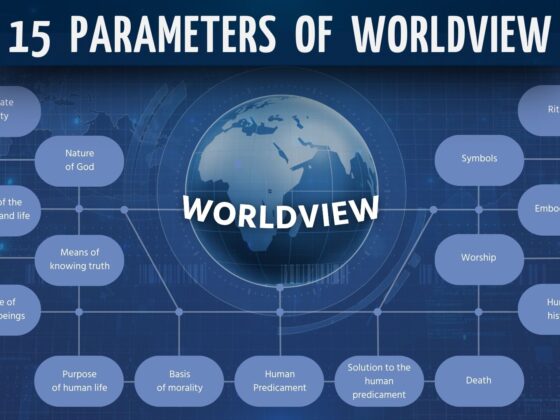Truth and Discipleship: Building a Biblical Worldview in Students (Param 04, means of knowing truth)
February 11, 2025
Exploring How We Know Truth
In today’s rapidly changing world, the concept of truth is often questioned. Different worldviews offer distinct interpretations of what truth is and how we come to know it. This raises important questions for Christian school leaders: What does it mean to truly know truth? How can we help students develop a mature, biblical worldview grounded in truth?
In this post, we’ll explore how three major worldviews—Naturalism, Pantheism, and Biblical Christianity—approach the concept of truth. By comparing these perspectives, Christian leaders can gain insights into how to nurture students’ worldview development, helping them build a foundation of truth rooted in Scripture.
What Is Truth? Exploring the Core Question
In our current educational landscape, the challenge of discerning truth has never been more pronounced. Students today are exposed to a variety of ways of thinking, making it difficult for them to understand truth in a consistent, meaningful way. This confusion often impacts their beliefs, behaviors, and attitudes.
At the heart of every worldview is the question of “What is truth?” In Christian education, it’s essential to understand that truth is not just an abstract concept—it is something that is revealed to us by God. The Bible teaches us that truth comes from God (John 14:6) and that the Holy Spirit guides believers into all truth (John 16:13). Christian leaders must recognize that truth is not something students can discover through their own reasoning or self-reflection alone. Instead, truth is revealed to us through God’s Word, with the Holy Spirit helping us understand and apply it.
In Noah Webster’s 1828 Dictionary, the definition of “truth” integrates the philosophical, theological, moral, and practical aspects of the term. Truth is not just about words or facts; it is also about integrity, divine alignment, and the essence of what is truly real.
The relationship between faith and reason is also important in the Christian worldview. While reason is a valuable tool, it must be harmonized with faith, with Scripture as the ultimate source of truth (2 Timothy 3:16-17). This Christian perspective on truth stands in contrast to the approaches taken by Naturalism and Pantheism.
For a deeper dive into the major worldviews and how they define truth, you can explore these posts:
- Teaching Comparative Worldviews: Dialogues on Ultimate Reality
- 2 Questions to See Worldview Heart Orientation
The Means of Knowing Truth Across Worldviews
Naturalism/Secular Humanism:
In Naturalism, truth is based on human reason and empirical evidence. It is derived from scientific methods and observable data. Naturalists believe that all truth can be known through the use of human intellect, excluding any divine revelation. Romans 1:19-20 speaks to the tension here: God’s truth is evident in creation, but those who follow Naturalism often reject this divine disclosure, relying instead on human reasoning alone.
However, without the guidance of Scripture and the Holy Spirit, human reasoning can be flawed. Naturalism’s emphasis on empirical data leaves little room for the mysteries of God’s divine truth, which are often beyond human understanding.
Pantheism/New Age:
Pantheism takes a very different approach to truth. Here, truth is often discovered through introspection, spiritual practices, and mystical experiences that connect individuals to a universal consciousness or divine mind. While these methods may seem profound, they lack a firm grounding in the revelation of God’s Word.
John 16:13 highlights the contrast: while Pantheism encourages individuals to seek truth through self-directed means, the Holy Spirit leads believers into all truth, offering divine guidance rooted in Scripture. Pantheistic approaches disconnect truth from the revealed Word of God, relying instead on subjective experiences and channeled revelations.
Biblical Christianity:
In contrast, the Christian view of truth is holistic. Truth is revealed through Jesus Christ (John 14:6), Scripture, and the Holy Spirit, who illuminates human conscience and reason. The Bible offers a comprehensive understanding of truth, providing clarity for every area of life. In Biblical Christianity, truth is not just about facts or information—it shapes how we live, how we think, and how we relate to God and others.
Students raised with a Biblical worldview are taught that truth is not self-derived but divinely revealed. This foundational understanding shapes their beliefs, attitudes, and behaviors, guiding them toward a Christ-centered life.
To explore how these worldviews influence student beliefs, check out:
Impact on Students’ Development of a Biblical Worldview
The way students understand truth shapes their entire worldview. When students adopt a Naturalistic or Pantheistic approach, their understanding of right and wrong, purpose, and the nature of reality will be profoundly different from students with a Biblical perspective.
Naturalism, for example, leads students to view morality and purpose as subjective and self-determined, based on human desires and societal norms. Pantheism may influence students to see truth as fluid and personal, with their experience of it determined by their spiritual practices. In contrast, Biblical Christianity offers a clear and absolute standard of truth, grounded in God’s Word and the teachings of Jesus Christ.
This foundation of truth is critical for students’ behavioral development. As John 8:32 reminds us, “Then you will know the truth, and the truth will set you free.” A mature Biblical worldview empowers students to live out their beliefs, guiding their actions and shaping their attitudes toward others and the world around them.
When Christian school leaders help students develop a Biblical worldview, they are not only imparting knowledge but also fostering a heart orientation toward Christ. This means that students’ beliefs are not just theoretical—they translate into action, affecting their behaviors and attitudes. The 3-D Worldview Survey (3DWS) is a valuable tool for leaders who seek to assess and guide this holistic development.
For more on developing biblical worldviews in the classroom, read:
- 10 Ideas for Classroom-Based Biblical Worldview Development
- Empowering Students to Deepen Their Understanding of Scripture
A Tool for Understanding and Cultivating Biblical Worldview: The 3-Dimensional Worldview Survey
For school leaders looking to deepen their understanding of students’ worldviews, the 3-Dimensional Worldview Survey (3DWS) provides a comprehensive tool. The 3DWS assesses students across three dimensions: belief, behavior, and attitude. By examining all three of these dimensions, leaders can gain a clearer picture of where students are in their worldview development.
The 3DWS helps leaders understand how students are internalizing their beliefs about truth and how those beliefs shape their actions. It also assesses students’ attitudes, providing valuable insight into their heart orientation toward Christ. This holistic assessment helps leaders support students in integrating their faith into every aspect of life.
Psalm 119:160 declares, “All your words are true; all your righteous laws are eternal.” The 3DWS aligns with this truth by helping leaders guide students toward a biblical foundation that endures through time.
Real-Life Application: Moving from Understanding to Discipleship
While understanding students’ worldviews is crucial, the goal is always discipleship—helping students grow into mature believers who live according to God’s truth. Colossians 2:8 warns, “See to it that no one takes you captive through hollow and deceptive philosophy.” Christian leaders must protect their students from secular worldviews and instead guide them toward a Christ-centered understanding of truth.
Practical application is key to discipleship. Leaders can use the insights gathered from tools like the 3DWS to mentor students, helping them apply their biblical worldview to everyday life. This includes guiding students in how they make decisions, engage with others, and navigate the challenges of the world around them. Ephesians 1:17-18 reminds leaders to pray for wisdom and revelation, as they equip students to live out their beliefs with Christ-centered clarity.
For resources on integrating worldview insights into mentoring and discipleship, see:
- What curriculum resources are out there, and what do you recommend?
- Exploring the Impact of Student Worldview in Decision Making
Next Steps for School Leaders
To cultivate a biblical worldview in students, Christian school leaders can begin by assessing their students’ worldviews using tools like the 3DWS. By understanding where students are in their worldview development, leaders can tailor their mentoring and teaching to address any gaps and guide students toward a mature, biblical perspective.
One helpful resource for leaders is the “10 Questions to Understand Worldview” guide, which offers practical questions for assessing students’ beliefs and behaviors. These questions can be used to identify students’ current worldview positions and begin the process of worldview formation in the classroom and beyond.
Begin with a Tool to Understand Worldview
As Christian school leaders, the task of guiding students toward a biblical worldview requires intentionality and insight. By using tools like the 3DWS, leaders can assess students’ beliefs, behaviors, and attitudes, helping them build a foundation of truth rooted in God’s Word.
Take the 3-D Worldview Survey for yourself to get a better understanding of how this tool can support your leadership efforts. Additionally, download the free PDF “10 Questions to Understand Worldview” to begin your assessment and take the first step toward nurturing biblical worldview development in your students.
Leaders can further equip themselves by diving deeper into understanding their students’ worldviews, using tools like the 3DWS and the 10 Questions guide. Assessing students’ worldviews is a crucial step in helping them develop a Biblical worldview that will shape their beliefs, behaviors, and attitudes. Embrace these tools to guide your students in their worldview formation.
- What Is the 3-D Worldview Survey?
- Take the 3-D Worldview for yourself
If you haven’t yet used the 3DWS with your class, check out the [lead magnet] below to get started.
#biblicalworldview #3dworldview #truthanddiscipleship
Key Takeaways
- Truth is central to forming a biblical worldview and impacts beliefs, behavior, and heart orientation.
- Each worldview defines truth differently—naturalism relies on reason, pantheism on personal experience, and biblical Christianity on divine revelation.
- Christian school leaders can use tools like the 3DWS to assess students’ worldviews and guide them toward biblical truth.





